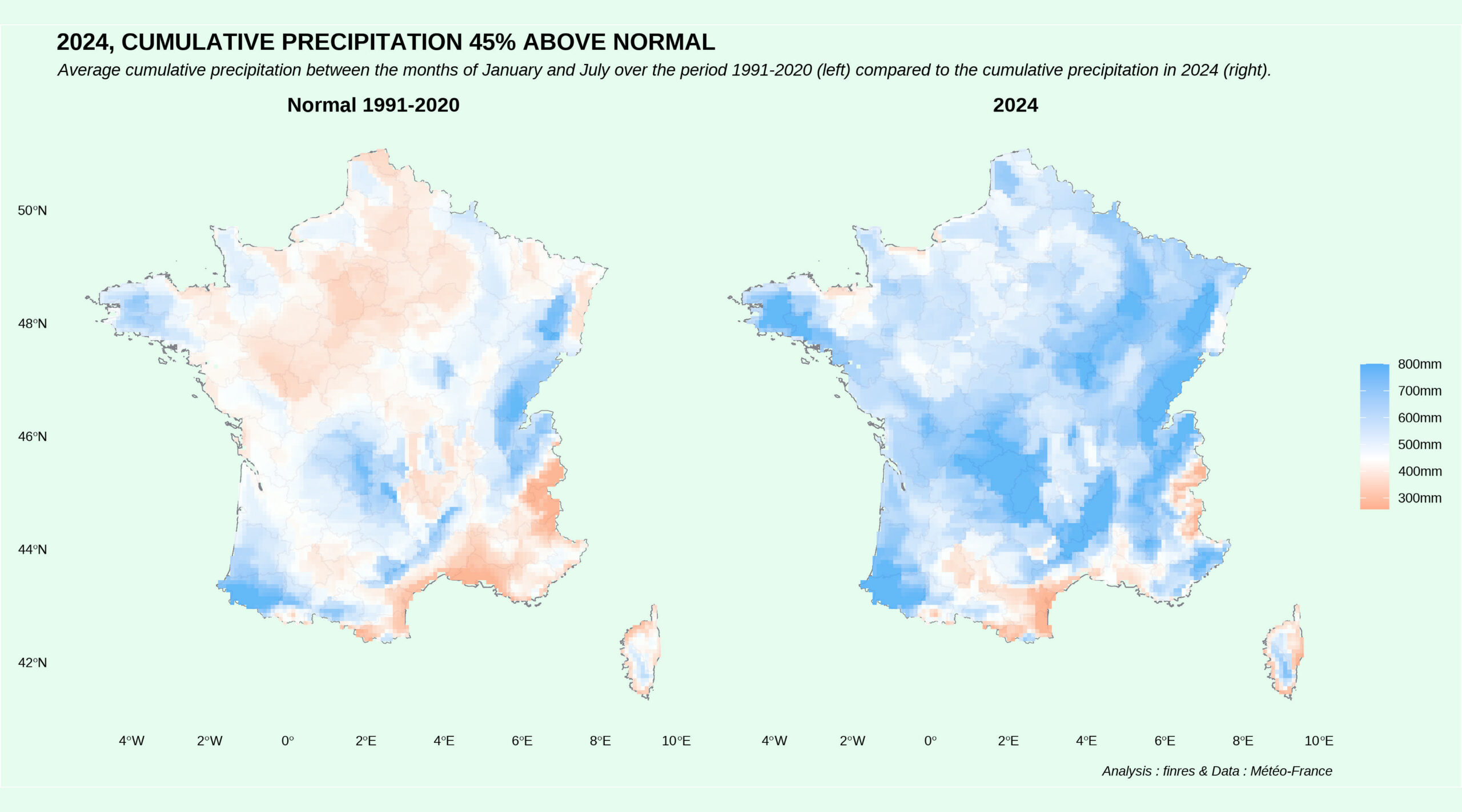France has just endured one of its wettest agricultural seasons in modern history, with total precipitation reaching levels 45% above the average from 1991-2020. This excess rainfall devastated yields, leaving the country’s main wheat-producing regions with one of the worst harvests in decades. Wheat production is down 26%, highlighting the vulnerability of the agricultural sector to climate extremes.
Farmers need greater support given this “new normal” for French agriculture: new analysis in The new normal: French agriculture in an era of climate extremes shows these extremely wet years will likely occur with 20-30% greater frequency by mid-century. For farmers, financial institutions, and policymakers, the reality of climate change requires urgent action today.
Key findings from the white paper:
- Too wet for wheat: New analysis from finres shows that in six of the biggest wheat-producing regions — Centre-Val de Loire, Grand Est, Île-de-France, Pays de la Loire, Hauts-de-France, and Normandy — excess precipitation leads to lower yields than even the low yields associated with years of drought
- Increased frequency of climate extremes: The likelihood of farmers in the wheat regions that supply over 60% of the country’s crop facing similar excess precipitation in the future will increase by 20% to 30% in the coming decades.
- The returns from adaptation: Every euro invested in adaptation measures, like drainage systems, could yield 1.40 euros in economic returns. Targeted adaptation measures could halve losses related to excess precipitation.
- Farmers can benefit from personalized support:providing location‑specific climate data, yield predictions, and adaptation recommendations enables farmers to mitigate severe losses and improve income stability.

AgHorizon: precision climate data to guide resilience investments
In response to the need for actionable, location-specific climate insights, finres has launched AgHorizon, a platform for farmers facing the impacts of climate change. AgHorizon provides location-specific data on agronomically relevant variables (such as precipitation, temperatures breaching certain thresholds, and evapotranspiration), yield projections, and impact on incomes.
Farmers enter their postcode to receive data and insights relevant to their farm, enabling them to make informed decisions about investments that could safeguard yields. Adaptation options are prioritized by their return on investment, empowering farmers to strengthen their resilience against greater climate volatility.
Insights for those committed to the future of farming
The new normal: French agriculture in an era of climate extremes is essential reading for farmers, agricultural investors, policymakers, and researchers. Farmers can use the findings and AgHorizon to prioritize adaptation investments that minimize the risks of crop loss. Financial institutions supporting the agricultural sector will gain an understanding of how adaptation financing can stabilize agricultural income under climate volatility. The report also provides valuable insights relevant to the ongoing policy discussion on how to support farmers from the impacts of climate change, not just in France but around the world.
Discover the findings and recommendations for adaptation in The new normal: French agriculture in an era of climate extremes and contact us to learn more about how to partner with finres to protect the future of farming.
The new normal: French agriculture in an era of climate extremes
Essential reading for farmers, agricultural investors, policymakers, and researchers on the scale of the devastation caused by the wet agricultural season in 2024, the increased frequency of such climate extremes in the near future, and also what can be done now to prepare.